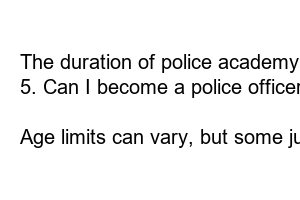경찰이 되는 방법
Title: Pursuing Your Dream Career: A Step-by-Step Guide to Becoming a Police Officer
Introduction:
If you have always been passionate about serving your community, protecting others, and maintaining law and order, then a career as a police officer may be your ideal path to pursue. In this blog post, we will guide you through the essential steps and qualifications to help you achieve your goal of becoming a police officer.
1. Determine Your Eligibility:
Before embarking on your journey to becoming a police officer, ensure you meet the basic eligibility criteria, such as being of a certain age, having a high school diploma or GED, and holding a valid driver’s license. Each jurisdiction may have specific requirements, so it’s important to conduct thorough research.
2. Education and Training:
Obtaining a degree in criminal justice or a related field can be advantageous when applying to become a police officer. These programs provide knowledge about the criminal justice system, laws, and investigative techniques that will be invaluable in your future career. Additionally, many police academies offer training programs that equip candidates with essential skills and knowledge required for the job.
3. Physical Fitness:
A police officer’s job demands physical strength, agility, and endurance. Engage in regular exercise routines that focus on cardiovascular fitness, strength training, and flexibility to ensure you meet the required physical fitness standards. Staying healthy and fit enhances your chances of success throughout this rigorous journey.
4. Pass the Written Exam:
Prepare thoroughly for the written exam, which typically includes sections on reading comprehension, writing skills, and logical reasoning. Utilize study resources and practice sample questions to familiarize yourself with the format and improve your chances of acing the exam.
5. Oral Interview and Background Check:
Successfully clear the oral interview and background investigation, during which your character, integrity, and suitability for the role of a police officer will be evaluated. Demonstrate your communication skills, problem-solving abilities, and commitment to serving the community effectively.
6. Attend Police Academy:
If selected, you will attend a police academy where you will undergo comprehensive training that encompasses the practical skills and knowledge necessary for a successful law enforcement career. This training can vary in duration but typically covers self-defense tactics, firearms training, crisis intervention, and legal procedures.
7. Field Training:
Upon graduating from the police academy, aspiring police officers usually undergo a field training program where they apply their acquired skills and knowledge under the supervision of experienced officers. This hands-on training is crucial for developing practical skills, decision-making abilities, and adapting to real-life scenarios.
Summary:
Becoming a police officer requires dedication, education, physical fitness, and a strong commitment to public service. By following the steps outlined above, you can position yourself for a successful journey towards achieving your dream career. Continuously refine your skills, stay informed about local law enforcement requirements, and be prepared to make a positive impact in your community.
FAQs:
1. Can I become a police officer without a degree in criminal justice?
Yes, many police departments accept applicants with various educational backgrounds. While a degree can be advantageous, it is not always a strict requirement.
2. Is there an age limit for becoming a police officer?
Yes, age requirements can vary depending on the jurisdiction. Generally, candidates need to be at least 18-21 years old to apply.
3. Will past criminal history automatically disqualify me from becoming a police officer?
Having a criminal record does not necessarily disqualify you from becoming a police officer. Each case is evaluated individually, and factors such as the nature and severity of the offense, rehabilitation, and time elapsed since the incident are considered.
4. How long does the police academy training typically take?
The duration of police academy training can range from a few months to over a year, depending on the program and jurisdiction.
5. Can I become a police officer if I wear glasses or contact lenses?
Many police departments have vision requirements for recruits. While perfect vision is not mandatory, it should be correctable to meet the required standards with glasses or contact lenses.
6. Is there a maximum age limit for joining the police force?
Age limits can vary, but some jurisdictions may have an upper age limit, often ranging from 35 to 45 years. This varies depending on the specific police agency and its requirements.

